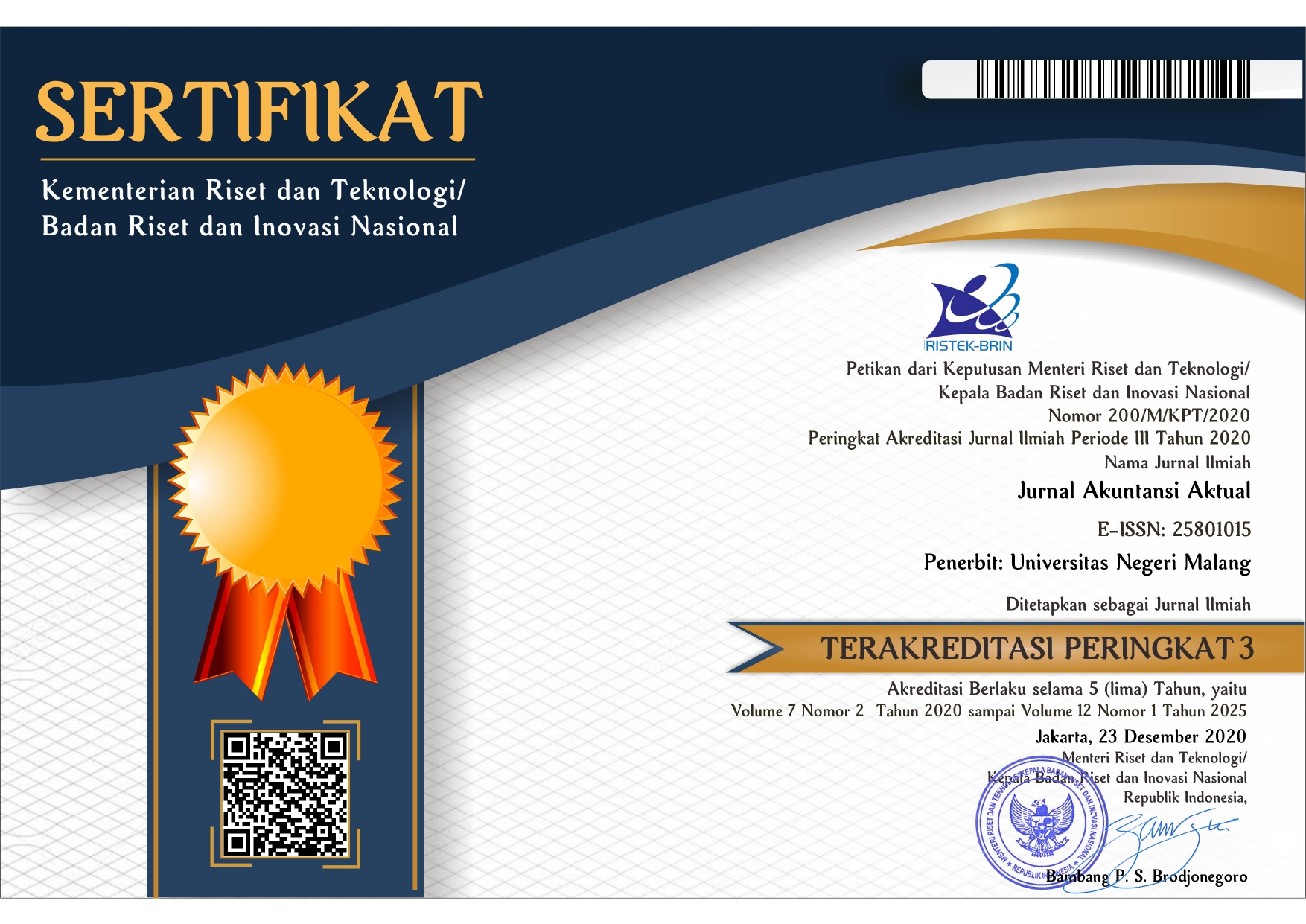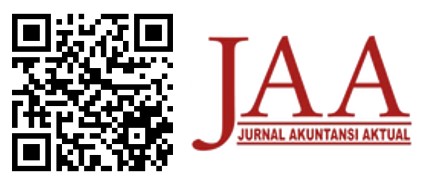Pengaruh non-financial distress, koneksi politik, dan intensitas persediaan terhadap tax avoidance
Abstract
Abstract
The purpose of this study is to analyze the relationship among non-financial distress, political connections, and inventory intensity and tax avoidance. The study was conducted on all pharmaceutical sub-sector companies from 2013 to 2018. We used data from the financial statements from the companies’ official websites and the IDX website. The data were analyzed using panel data regression. We find that nonfinancial distress and political connections affect tax avoidance practices. However, inventory intensity has no influence on tax avoidance practices.
Abstrak
Tujuan penelitian ini adalah untuk menganalisis hubungan non-financial distress , koneksi politik, dan intensitas persediaan terhadap tax avoidance. Populasi penelitian adalah seluruh perusahaan subsektor farmasi dari 2013 hingga 2018. Data diperoleh dari laporan keuangan yang terdapat pada website resmi perusahaan dan BEI. Data pada penelitian ini dianalisis menggunakan regresi data panel. Penelitian ini menemukan bahwa non-financial distress dan koneksi politik dapat mempengaruhi pengaruh praktik tax avoidance. Akan tetapi, intensitas persediaan tidak dapat mempengaruhi praktik tax avoidance.
Keywords
Full Text:
PDFReferences
Adisamartha, I. B., & Noviari, N. (2015). Pengaruh Likuiditas, Leverage, Intensitas Persediaan, dan Intensitas Aset Tetap pada Tingkat Agresivitas Wajib Pajak Badan. E-Jurnal Akuntansi Universitas Udayana, 13(3), 973-1000.
Altman, E. I. (1986). The Prediction of Corporate Bankruptcy: A Discriminant Analysis. The Journal of Finance, 23(1), 193-194. doi:10.1111/j.1540-621.1968.tb03007.x.
Andhari, P. A., & Sukartha, I. M. (2017). Pengaruh Pengungkapan Corporate Social Responsibility, Profitabilitas, Inventory Intensity, Capital Intensity, dan Leverage pada Agresivitas Pajak. E-Jurnal Akuntansi Universitas Udayana, 18(3), 2115-2142.
Andikaningprang, A., Pratomo, D., & Kurnia. (2017). Pengaruh Foreign Investors’ Interest dengan Variabel Kontrol Profitabilitas, Ukuran Perusahaan, dan Leverage terhadap Tax Avoidance. E-Proceeding of Management, 4 (2), 1521-1526.
Ardyansah, D., & Zulaikha. (2014). Pengaruh Size, Leverage, Profitability, Capital Intensity Ratio, dan Komisaris Independen terhadap Effective Tax Rate (ETR). Diponegoro Journal of Accounting, 3(2), 1-9.
Basuki, A. T., & Prawoto, N. (2016). Analisis Regresi dalam Penelitian Ekonomi & Bisnis. Depok: PT Rajagrafindo Persada.
Dharma, I. M., & Ardiana, P. A. (2016). Pengaruh Leverage, Intensitas Aset Tetap, Ukuran Perusahaan, dan Koneksi Politik terhadap Tax Avoidance. E-Jurnal Akuntansi Universitas Udayana, 15(1), 584-613.
Dyreng, S. D., Hanlon, M., & Maydew, E. (2008). Long-Run Corporate Tax Avoidance. The Accounting Review, 83(1), 61-82. doi:10.2308/accr.2008.83.1.61.
Dyreng, S. D., Hanlon, M., & Maydew, E. (2010). The Effects of Executives on Corporate Tax Avoidance. The Accounting Review, 85(4), 1163–1189. doi:10.2308/accr.2010.85.4.1163.
Ferdiawan, Y., & Firmansyah, A. (2017). Pengaruh Political Connection, Foreign Activity, dan Real Earning Management terhadap Tax Avoidance. Jurnal Riset Akuntansi dan Keuangan, 5(3), 1601-1624. doi:10.17509/jrak.v5i3.9223.
Hanafi, M., & Halim, A. (2012). Analisis Laporan Keuangan. Yogyakarta: UPP STIM YKPN.
Hanafi, U., & Harto, P. (2014). Analisis Pengaruh Kompensasi Eksekutif, Kepemilikan Saham Eksekutif, dan Preferensi Risiko Eksekutif terhadap Penghindaran Pajak Perusahaan. Diponegoro Journal of Accounting, 3(2), 1-11.
Hanlon, M., & Heitzman, S. (2010). A Review of Tax Research. Journal of Accounting and Economics, 50, 127-178. doi: 10.1016/j.jacceco.2010.09.002.
Jensen, M. C., & Meckling, W. H. (1976). The Theory of the Firm: Manjerial Behavior, Agency Cost, and Ownership Structure. Journal of Financial and Economic, 3(4), 305-360. doi:10.1016/0304-405X(76)90026-X.
Kasmir. (2015). Analisis Laporan Keuangan. Jakarta: Rajawali Pers.
Kim, C., & Zhang, L. (2016). Corporate Political Connections and Tax Aggressiveness. Contemporary Accounting Reseach, 33(1), 78-114. doi:10.1111/1911-3846.12150.
Mardiasmo. (2019). Perpajakan. Yogyakarta: CV Andi Offset.
Mulyani, S., Darminto, & Pamungkas, M. G. W. E. N. (2014). Pengaruh Karakteristik Perusahaan, Koneksi Politik, dan Reformasi Perpajakan terhadap Penghindaran Pajak. Jurnal Mahasiswa Perpajakan, 2(1), 1-9.
Nugroho, S. A., & Firmansyah, A. (2017). Pengaruh Financial Distress, Real Earnings Management, dan Corporate Governance terhadap Tax Aggressiveness. Journal of Applied Business Administration, 1(2), 163-182. doi:10.30871/jaba.v1i2.616.
Oktamawati, M. (2017). Pengaruh Karakter Eksekutif, Komite Audit, Ukuran Perusahaan, Leverage, Pertumbuhan Penjualan, dan Profitabilitas terhadap Tax Avoidance. Jurnal Akuntansi Bisnis, 15(1), 23-40. doi:10.24167/jab.v15i1.1349.
Pemerintah Indonesia. (2009). Undang-Undang Republik Indonesia Nomor 16 Tahun 2009 tentang Penetapan Peraturan Pemerintah Pengganti Undang-Undang Nomor 5 Tahun 2008 tentang Perubahan Keempat atas Undang-Undang Nomor 6 Tahun 1983 tentang Ketentuan Umum dan Tata Cara Perpajakan Menjadi Undang-Undang. Lembaran Negara Republik Indonesia Tahun 2009 Nomor 62. Jakarta: Sekretariat Negara.
Pohan, C. A. (2016). Manajemen Perpajakan. Jakarta: PT. Gramedia Pustaka Umum.
Purwoto, L. (2011). Pengaruh Koneksi Politis, Kepemilikan Pemerintah, dan Keburaman Laporan Keuangan terhadap Kesinkronan dan Risiko Crash Harga Saham . (Disertasi, Universitas Gadjah Mada, Yogyakarta).
Santoso, I., & Rahayu, N. (2013). Corporate Tax Management. Jakarta: Observation & Research of Taxation (Ortax).
Sari, D. (2013). Konsep Dasar Perpajakan. Bandung: PT Refika Aditama.
Sudibyo, Y. A., & Jianfu, S. (2016). Political Connections, State Owned Enterprises, and Tax Avoidance: An Evidance from Indonesia. Corporate Ownership & Control, 13(3), 279-283. doi:10.22495/cocv13i3c2p2.
Watts, R. L., & Zimmerman, J. L. (1986). Positive Accounting Theory. New Jersey: Prentice-Hall.
DOI: http://dx.doi.org/10.17977/um004v8i22021p107
Refbacks
- There are currently no refbacks.

This work is licensed under a Creative Commons Attribution-ShareAlike 4.0 International License.
Jurnal Akuntansi Aktual is indexed by:















